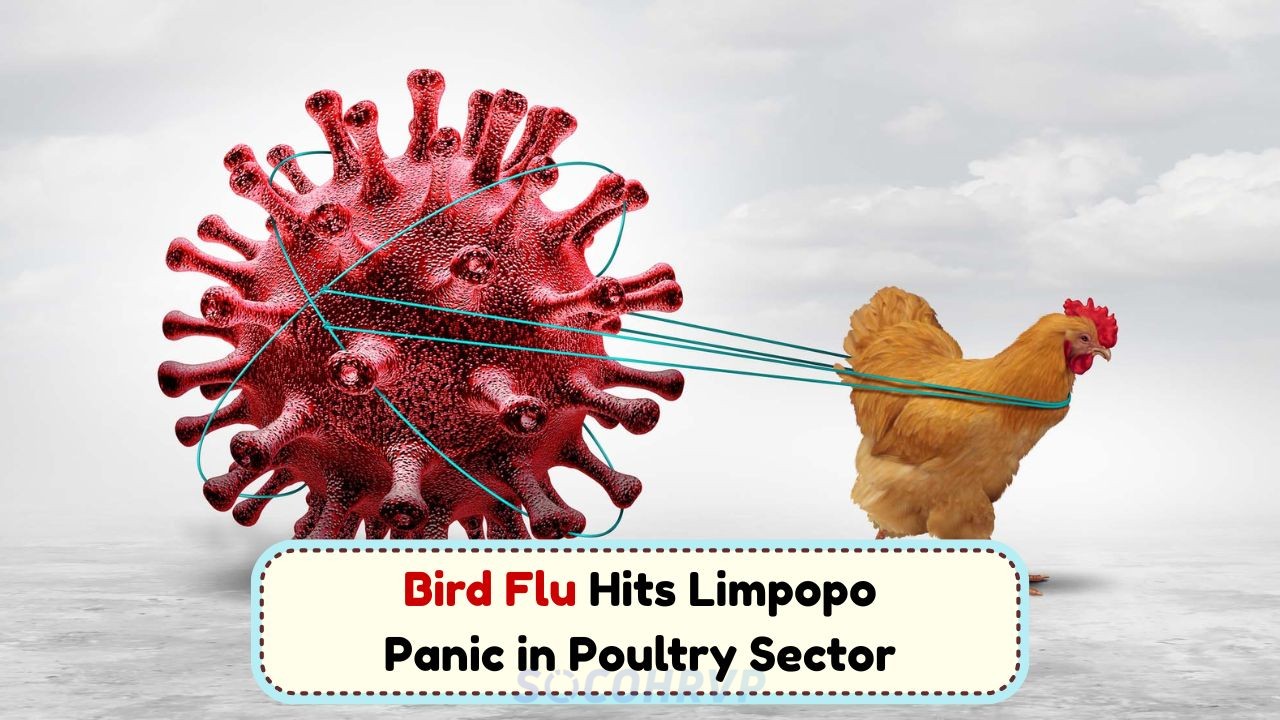July Warning: Limpopo’s Poultry Industry Faces Bird Flu Threat: The poultry industry in Limpopo is grappling with a severe challenge as the highly pathogenic avian influenza, commonly known as bird flu, makes its presence felt in the region. This outbreak, first detected in July, has put the entire sector on high alert, prompting immediate action to contain the spread and protect the livelihoods of those dependent on poultry farming. With bird flu being notorious for its rapid transmission and devastating impact, stakeholders are mobilizing resources to mitigate the threat and shield the economy from potential losses.
The Impact of Bird Flu on Limpopo’s Poultry Sector
The outbreak of bird flu in Limpopo threatens to disrupt the poultry industry, which is a significant contributor to the local economy. Poultry farms, both large and small, are under pressure to implement stringent biosecurity measures to prevent the virus from wiping out entire flocks. The economic implications are dire, with potential job losses and financial strain on farmers who are already facing numerous challenges.
- Immediate culling of infected birds to prevent further spread.
- Enhanced surveillance and monitoring by veterinary authorities.
- Public awareness campaigns to inform farmers and the public.
- Collaboration between government and industry stakeholders.
- Financial support for affected farmers to sustain operations.
- Research and development of vaccines to combat the virus.
- Restrictions on movement of poultry and related products.
- Continuous evaluation of containment strategies.
How Bird Flu Spreads in Poultry Farms
Understanding the mechanisms of bird flu transmission is crucial for controlling its spread. The virus can be transmitted through direct contact with infected birds or indirectly through contaminated equipment, feed, and water. Migratory birds often play a role in introducing the virus to domestic flocks. Once introduced, the virus can spread rapidly within a farm and to neighboring facilities, necessitating swift containment measures.
| Mode of Transmission | Description | Prevention |
|---|---|---|
| Direct Contact | Infected bird to healthy bird | Isolate infected birds immediately |
| Indirect Contact | Contaminated equipment and surfaces | Regular disinfection protocols |
| Waterborne | Contaminated water sources | Ensure clean and safe water supplies |
| Airborne | Aerosolized virus particles | Implement air filtration systems |
Steps to Combat Bird Flu in Limpopo
In response to the bird flu threat, stakeholders are taking decisive steps to safeguard the poultry industry in Limpopo. The Department of Agriculture has outlined a comprehensive strategy involving several key actions to curb the outbreak and prevent future occurrences.
 Eastern Cape Students Brace for Extended July 2025 School Shutdown as Flood Repairs Linger
Eastern Cape Students Brace for Extended July 2025 School Shutdown as Flood Repairs Linger
- Strengthening biosecurity measures across all poultry farms.
- Conducting regular inspections and testing for early detection.
- Providing training and resources to farmers on disease management.
- Issuing guidelines for safe disposal of infected birds.
- Facilitating access to financial aid and insurance for affected farmers.
- Engaging in cross-border collaborations to monitor migratory bird patterns.
- Investing in research for effective vaccines and treatments.
- Encouraging community involvement in reporting suspicious cases.
Challenges Facing Limpopo’s Poultry Industry Amid Bird Flu
The poultry industry in Limpopo is navigating a complex landscape amid the bird flu outbreak. Farmers are grappling with the financial burden of implementing necessary biosecurity measures while facing potential market disruptions due to reduced supply and consumer fear. Moreover, the lack of a readily available vaccine compounds the challenge, necessitating a reliance on preventive measures and timely intervention.
 Budget 2025 Brings Major Financial Relief with Pension and Child Grant Increases Confirmed
Budget 2025 Brings Major Financial Relief with Pension and Child Grant Increases Confirmed
- High costs associated with biosecurity enhancements.
- Potential loss of income due to reduced bird population.
- Market uncertainty affecting poultry product prices.
- Logistical challenges in transporting unaffected poultry.
- Need for comprehensive farmer education and support.
- Pressure on veterinary services to manage and control the outbreak.
- Public concern over the safety of poultry products.
- Coordination challenges among stakeholders.
Government’s Role in Managing Bird Flu in Limpopo
The South African government plays a pivotal role in managing the bird flu crisis in Limpopo. By setting up task forces and providing necessary resources, the government is working to ensure that the outbreak is contained and that the poultry industry can recover swiftly. This includes financial aid packages for affected farmers and strategic communication to reassure the public about the safety of consuming poultry.
- Mobilization of rapid response teams for immediate action.
- Partnerships with international health organizations for expertise.
- Allocation of funds for emergency response efforts.
- Development of a long-term strategy to enhance biosecurity.
- Regular updates to the public on outbreak status and measures.
- Incentives for farmers to adopt best practices in biosecurity.
Community Involvement in Combating Bird Flu
Community involvement is crucial in combating the bird flu outbreak in Limpopo. Local communities play a vital role in reporting unusual bird deaths, thereby enabling quick action by authorities. Educational programs are being rolled out to encourage the public to participate actively in monitoring and reporting, ensuring that the virus is contained effectively.
- Encouraging local surveillance and reporting systems.
- Community workshops on recognizing symptoms of bird flu.
- Distribution of educational materials on prevention methods.
- Collaboration with local organizations for outreach and support.
- Incentives for community members to participate in monitoring.
Long-term Solutions for Limpopo’s Poultry Industry
As Limpopo’s poultry industry contends with the bird flu outbreak, long-term solutions are being considered to bolster resilience against future threats. These solutions focus on enhancing biosecurity infrastructure, advancing research, and fostering collaboration among stakeholders to create a sustainable and robust poultry sector.
- Investment in advanced biosecurity technologies.
- Development of regional centers for disease control.
- Encouraging innovation in poultry farming practices.
- Strengthening communication channels among stakeholders.
- Implementing continuous training programs for farmers.
FAQs on Bird Flu in Limpopo’s Poultry Industry
- What is bird flu, and how does it affect poultry? Bird flu is a viral infection that affects birds, particularly poultry, causing high mortality rates and economic losses.
- How can farmers protect their flocks from bird flu? Farmers can protect their flocks by implementing strict biosecurity measures, regular health checks, and isolating infected birds.
- Is it safe to consume poultry products during a bird flu outbreak? Yes, as long as poultry is properly cooked, it is safe to consume. The virus does not survive high cooking temperatures.
- What measures is the government taking to control the outbreak? The government is enhancing surveillance, providing financial support to farmers, and promoting public awareness to control the outbreak.
- Can bird flu affect humans? While rare, certain strains of bird flu can infect humans, typically after direct contact with infected birds.






